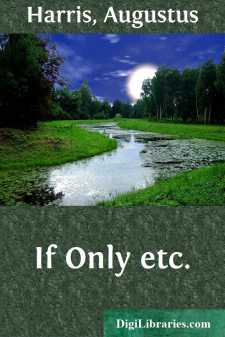Categories
- Antiques & Collectibles 13
- Architecture 36
- Art 48
- Bibles 22
- Biography & Autobiography 813
- Body, Mind & Spirit 142
- Business & Economics 28
- Children's Books 15
- Children's Fiction 12
- Computers 4
- Cooking 94
- Crafts & Hobbies 4
- Drama 346
- Education 46
- Family & Relationships 57
- Fiction 11828
- Games 19
- Gardening 17
- Health & Fitness 34
- History 1377
- House & Home 1
- Humor 147
- Juvenile Fiction 1873
- Juvenile Nonfiction 202
- Language Arts & Disciplines 88
- Law 16
- Literary Collections 686
- Literary Criticism 179
- Mathematics 13
- Medical 41
- Music 40
- Nature 179
- Non-Classifiable 1768
- Performing Arts 7
- Periodicals 1453
- Philosophy 64
- Photography 2
- Poetry 896
- Political Science 203
- Psychology 42
- Reference 154
- Religion 513
- Science 126
- Self-Help 84
- Social Science 81
- Sports & Recreation 34
- Study Aids 3
- Technology & Engineering 59
- Transportation 23
- Travel 463
- True Crime 29
If Only etc.
by: Augustus Harris
Categories:
Description:
Excerpt
CHAPTER I.
There is a vast deal talked in the present day about Freewill. We like to feel that we are independent agents and are ready to overlook the fact that our surroundings and circumstances and the hundred and one subtle and mysterious workings of the fate we can none of us escape, control our actions and are responsible for our movements, and make us to a great extent what we are.
A man is not even a free agent when he takes the most important step of his whole life, and marries a wife. He is impelled to it by considerations outside of himself; it affects not only his own present and future, but that of others, very often, and he must be guided accordingly.
Emerson says; "The soul has inalienable rights, and the first of these is love," but he does not say marriage. Love is the business of the idle and the idleness of the busy, but marriage is quite another affair—a grave matter, and not to be undertaken lightly, since it is the one step that can never be retraced, save through the unsavoury channels of shame and notoriety, or death itself.
But perhaps Jack Chetwynd was hampered with fewer restraining influences than most men, for he was alone in the world, without kith or kin, and might be fairly allowed to please himself, and pleasing himself in this case meant leading to the altar, or rather to the Registry Office, Miss Bella Blackall, music-hall singer and step dancer.
It was unquestionably a case of love at first sight. The girl was barely seventeen, and her girlishness attracted him quite as much as her beauty, which was exceptional. There was nothing meretricious about it, for as yet she owed nothing to art—brown hair, warm lips, soft blue eyes, and a complexion like the leaf of a white rose—a woman blossom. Then, too, she was a happy creature, full of life and happiness and bubbling over with childish merriment—no one could help liking her, he told himself, but it was something warmer than that. What makes the difference between liking and love? It is so little and yet so much. There was an air of refinement about her, too, which to his fancy seemed to protest against the vulgarities of her surroundings. He thought he could discern the stuff that meant an actress in her, and prophesied that she would before long be playing Juliet at the Haymarket. He was still at the age when the habit is to discover geniuses in unlikely places, especially when the women are pretty. He raved about her when he adjourned with his companions to the bar, and they chaffed him a good deal to his face and sneered at him behind his back. He was there the next night, and the night, after and by-and-by he managed to get introduced to her.
She was prettier off the stage than on, and her manner was charming, and her voice delicious with its racy accent.
She was an American, and had been in London only a few months; and he was duly taken to a second-rate lodging in a side street near the Waterloo Road, and presented to "Ma,"—a black satined and beaded type of the race....


